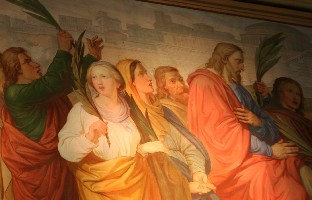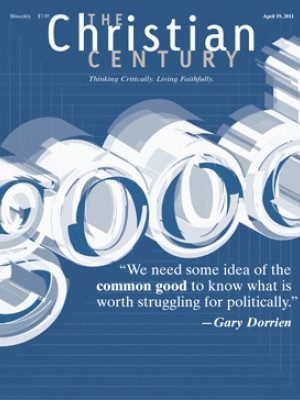Amid messy politics

In the Presbyterian church of my youth, Palm Sunday barely rated a nod of the head. There might have been a pot of palm fronds up front, but they stayed in the pot. Nobody waved them around. They weren't placed behind a picture of Jesus in the living room, left to dry and then burned in the spring to produce ashes, like the palms in the homes of my Roman Catholic chums. That all seemed slightly exotic.
Today, however, many of us mainliners impose ashes on Ash Wednesday and send palm-waving children down the center aisle as we sing "All Glory, Laud and Honor." It's a little show-offy, but I love it.
We know, of course, that in only five days Jesus will be crucified by the Roman authorities. This reality gives the Palm Sunday event irony, celebration and tragedy, shouts of joy and cries of pain and lament—a convincing mix because it's so characteristic of life in this world.
Read our latest issue or browse back issues.
Jesus seems to be presiding over each act. It's his decision to go to the capital city, the political and religious center of his people's life, and to go there when the city is full of religious pilgrims and occupying Romans. It's also his decision to arrive in the city in the way a prophet said the Messiah would arrive—on a donkey.
His intentionality makes it impossible to entertain the notion that the religion that bears his name is not social, worldly and political. As Frances Taylor Gench says in Encounters with Jesus, the Palm Sunday parade stands exactly at the intersection between religion and politics.
Last year Fox talk show host Glenn Beck called on Christians to "look for the words 'social justice' and 'economic justice' on your church's website, and if you can find them there, run away. . . . [They] are code words for socialism, Nazism, Communism." There is a sense in which Beck was right. Our faith is not about socialism, Nazism or communism, but it is about justice and a religious tradition that challenges social structures and political and economic arrangements that work to the disadvantage of the poor and vulnerable.
I picture Glenn Beck among those who begged Jesus not to go to the capital city at such a politically volatile moment but to stay in Galilee, miles away from the messy politics, the deal making and conflicts.
If we're following Jesus, we can't spend our lives in Galilee. We can't hide behind the popular myth that religion and politics don't mix. We need this reminder as our nation debates the necessity of responsible budgeting and the necessary sacrifices that will allow it to happen. What happened on Palm Sunday suggests that we ought to be right in the middle of that debate.






